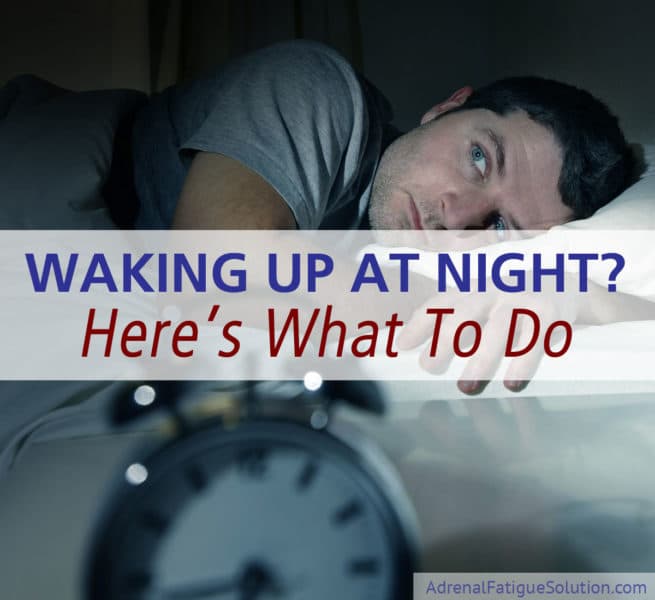Sleep deprivation is a common topic in adrenal fatigue forums. As if being depleted of energy during the day isn’t hard enough to deal with, the frustration of getting insufficient rest at night is enough to send anyone into a depressing downward spiral.
Most people who live with adrenal exhaustion are familiar with the role that cortisol has to play in sleep patterns. Spikes in the evening stop you from drifting off, and lows in the morning make it a herculean task to get out of bed. But this isn’t the only problem for sufferers; it appears that staying asleep for a full eight hours is a rare luxury for most people living with the condition.
Waking during the night deprives the body of the opportunity to reach the deepest sleep states necessary for repair and rest. Going to bed earlier, or having an extra hour’s lie-in, isn’t going to make any difference if you’re waking two or three times during the night. So why is waking during the night a particular problem for people with adrenal fatigue? More importantly, what can you do about it?
What Causes Waking In The Night?
It’s completely normal to wake up at various stages in the night as the brain moves naturally through the sleep cycle. Most people simply roll over and go straight back to sleep, but for adrenal fatigue sufferers, something much deeper is going on.
It’s a well-known fact that people with adrenal exhaustion have issues controlling their blood sugar. This is because the hormones involved in the stress response also play a large role in the regulation of glucose. When a person is in a continual state of fight or flight (as is the case for adrenal fatigue sufferers) the body sends out a signal to raise blood sugar so there’s sufficient energy to respond to the stress. However, if demand can’t be met, then hypoglycaemia or low blood sugar results.
Studies show that people who have difficulty controlling their blood sugar levels during the day are also prone to crashes at night. These hypoglycaemic episodes typically occur around 3am, the time most people are entering the deepest levels of sleep. These blood sugar crashes send stress signals to the brain, which alerts the adrenals to pump out adrenalin. Hey presto – you’re awake.
There are a number of other reasons why getting your blood sugar under control could be the key to getting a better night’s sleep.
- High blood sugar levels can cause you to feel hot, irritable and restless. If you’re waking at night throwing off the covers and sweating – it’s a clear sign that your blood glucose levels are out of whack.
- In contrast, low blood sugar levels can cause nightmares. If you regularly experience bad dreams which wake you up, then this is another indication that fluctuating glucose levels are likely to be an issue for you.
- High blood sugar causes nocturea (waking to go to the toilet at night.) For many people this isn’t something they pay too much attention too and may brush it off as nothing more than a “weak bladder.” However, getting up frequently to use the toilet at night time doesn’t just disturb sleep; it may also be a sign of uncontrolled blood sugar linked to the onset of Type II Diabetes.
What To Do About It
All the evidence suggests that one of the key things adrenal fatigue sufferers can do to improve their sleep hygiene is to keep a close eye on blood sugar levels. Glucose monitors can be bought relatively cheaply online and are the best way to get a clear indication of fluctuating blood sugar levels. This information can then be used to help make better choices about diet, which is fundamental for getting blood sugar (and by default, insulin levels) under control.
The next step is to plan balanced meals based around healthy choices. Avoid eating too many refined carbohydrates and processed foods which contain hidden sugars which cause blood sugar levels to spike. A ton of recipes and useful information around the topic of diet can be found on the website, and a complete list of which foods to eat and avoid can also be found in the Adrenal Fatigue Solution e-Book.
Although having adrenal fatigue often means lacking the energy to exercise, doing a small amount of physical activity during the day can also help you get a better night’s sleep. A gentle yoga class or even a walking the dog for half an hour during your lunch break can really make the difference between feeling tired, or wired at the end of the day.
Takeaway
Getting a good night’s sleep depends on many factors. It’s far more complex than simply keeping an eye on what time you go to bed. For most people with adrenal fatigue, getting blood sugar levels under control could make a significant difference to their quality of sleep, which in turn has huge implications for energy levels during the day.
The following articles about diet and sleep may also be useful:
How to eat your way to a better night’s sleep
Could these 3 food groups be making you tired?
How much sugar do we eat today and why does it matter?




Leave a Reply